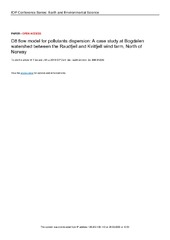D8 flow model for pollutants dispersion: A case study at Bogdalen watershed between the Raudfjell and Kvitfjell wind farm, North of Norway
Permanent link
https://hdl.handle.net/10037/17881Date
2019Type
Journal articleTidsskriftartikkel
Peer reviewed
Abstract
Investments in wind power are booming in Norway. Several wind power plants have been constructed to exploit the wind energy. However, construction of wind farms has potential impacts on the surrounding environment. Particularly, waste from construction site or activities of workers, leakage of oil and chemical would spread into the nearby waterbodies by runoff or infiltrating into ground. Hence, quality of surface water and ground water would be degraded. Raudfjell and Kvitfjell is the biggest on-shore wind power project in the north of Norway and is underconstruction. However, water quality around these two wind farms has been reported to be seriously polluted. The pollutants in the water are expected to disperse to surrounding area by runoff and accumulate at certain accumulation areas in the watershed. Therefore, it is of great importance to identify the directions of pollutants transportation and the potential vulnerable areas that may be affected by the pollution. This paper built up a D8 flow model to investigate pollutants dispersion at the small-scale watershed Bogdalen located between Raudfjell and Kvitfjell wind farm area. The model identified in detail possible single-flow directions on each cell of ground surface and detected the potential pathways where pollutants are expected to transport to and accumulate. The results stated that the model has provided promising results for pollution management.
Citation
Bui, M. T.; Lu, J.( 2019) D8 flow model for pollutants dispersion: A case study at Bogdalen watershed between the Raudfjell and Kvitfjell wind farm, North of Norway. IOP Conference Series: Earth and Environmental Science (EES), 344, , 012036Metadata
Show full item recordCollections
Published under licence by IOP Publishing Ltd


 English
English norsk
norsk